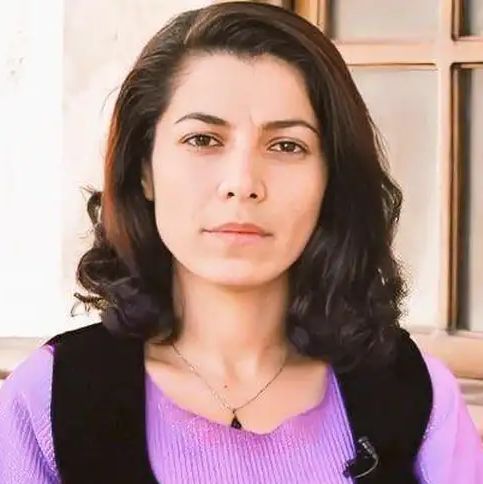Re-post from Shahrokh Zamani Action Campaign
Varisheh Moradi, a political prisoner and a member of the Association of Free Women of Eastern Kurdistan (KJAR), has been sentenced to death by Tehran’s Islamic Revolution Court on charges of “rebellion”.
According to HRANA and the Kurdistan Human Rights Network, the verdict of Branch 15 of Tehran’s Islamic Revolution Court was delivered to Ms Moradi’s defence lawyers on Sunday, November 10th.
The Iranian regime’s security forces arrested Varisheh Moradi on August 1st 2023 on the outskirts of Sanandaj. On December 26th 2023, after the various stages of her interrogation process were completed, she was transferred from the Intelligence Ministry’s detention centre in Evin prison, known as Ward 209, to the prison’s women’s ward.
During her court sessions on January 16th 2024 and October 5th 2024, and when the death sentence was announced to her lawyers on November 20th, Ms Moradi was not allowed to defend herself. Judge Abolghasem Salavati also did not even allow her lawyers to defend her and denied them the right to examine their client’s case beforehand. Only after the second court session had ended, they were allowed a few hours to study their client’s indictments.
According to the Kurdistan Human Rights Network, Verisheh Moradi was sentenced to death, even though an earlier indictment, based on Article 288 of the Islamic Penal Code, had requested a maximum of 15 years in prison. But in an illegal process, the judge issued the death sentence based on Article 287 of this law. According to Article 288 of the Islamic Penal Code: “Whenever the members of a rebel group are arrested before any clashes and the use of weapons … they shall be imprisoned …” However, according to Article 287 of this law: “If a group carries out an armed insurrection against the foundations of the system of the Islamic Republic of Iran, it is considered rebellious, and if it used weapons, its members will be sentenced to death.”
Hengaw, the human rights organisation, reports that in February 2023 Verisheh Moradi was accused of being a member of the Kurdistan Free Life Party (PJAK). Since May 6th 2024 Ms Moradi has been denied the right to family visits.
On August 1st 2023, Varisheh Moradi, who is from Sanandaj, was arrested by agents of the Ministry of Intelligence while returning from Kermanshah to Sanandaj. There was no resistance, violence or shooting during her arrest. After 13 days of detention in Sanandaj, she was transferred to Ward 209 of Evin prison and was tortured to make a confession. After five months of solitary confinement, she was transferred to the women’s ward of Evin prison on January 16th 2024.
A year later, on August 4th 2024, as a protest against the death sentences of Pakhshan Azizi and Sharifeh Mohammadi, Ms Moradi refused to appear in court. On October 10th, Varisheh Moradi went on hunger strike for 20 days in protest against the Islamic Republic of Iran’s death sentences and executions. Early in November, because of gastrointestinal problems following her hunger strike, she was transferred to a medical centre outside prison. After being hospitalised for one night, she was returned to Evin.
According to the Kurdistan Human Rights Network, after starting her hunger strike, Ms Moradi wrote: “Don’t let the cross-border wars cast a shadow over the internal repression of society. At any cost, we will not allow the voices of internal fighters, who are standing bravely, to be lost in the noise of endless wars and adventures.” She also emphasised that she went on a hunger strike to support the global “No to execution” campaign.
The Shahrokh Zamani Action Campaign strongly condemns the arrest and continuing detention of Varisheh Moradi and all Kurdish activists and citizens in Iran and calls for their immediate and unconditional release. We urge all trade unionists, socialists and other political activists to help us in defending the rights of all workers, political prisoners and social rights’ activists in Iran.
Free all political prisoners in Iran!
Shahrokh Zamani Action Campaign
Source: HRANA and the Kurdistan Human Rights Network.



